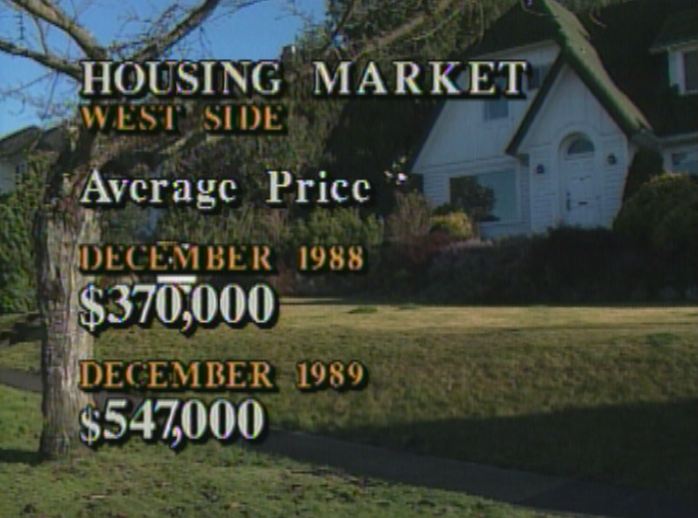“What do you think of Asian investment in Vancouver?” asks a reporter to a young couple.

“We talk about this every day,” says the woman with a laugh.
“I am totally opposed, totally. I don’t think it’s fair at all. People like us, a young married couple and we’ve lived here all our lives, and we can’t afford to buy a house. We save and we save, and it doesn’t matter, because the prices keep going up because the foreign people keep coming in and keep buying.”
It’s an exchange that could have happened this week, as people in Metro Vancouver continue to deal with soaring real estate prices and the unknown effect foreign investment has on the housing market.
READ MORE: Study suggests overseas buyers impacting Vancouver real estate market
But it’s not a new debate – that exchanged happened in 1989.
It’s one of many illuminating conversations in a documentary aired by this station – then known as BCTV – more than 26 years ago.
In the previous year Vancouver experienced a real estate boom. Prices for homes on the west side of the city rose by 40 per cent, and the average age of residents was quickly rising.
At the same time, a growing contingent of immigrants from Hong Kong were arriving in Vancouver (up to 10,000 a year) and purchasing property. In 1986, the Bank of British Columbia was acquired by HSBC. In 1988, Hong Kong billionaire Li Ka-shing purchased the Expo 86 site along False Creek.
“Something’s going to have to be done about all the things they’re buying up. Some kind of law being passed, because they’re buying everything,” said one person to BCTV reporter Colleen Leung, who presented the series.

Leung portrays Vancouver as an anxious city, emotional over the rapid pace of development.
“Vancouverites were shocked to learn that some condos sold out in Hong Kong before they were built, and before Canadians had a chance to buy them,” she says at one point.
“Chinese Canadians thought discrimination was gone forever, but with the arrival of the new asia money, they realize the old battles will have to fought all over again.”

And while today the parts of the debate tinged with racism have mostly moved to the internet, in 1989 people seemed to be more willing to speak with vitriol to the camera – and our station dispassionately gave them equal air time.
“Thirty per cent have finally admitted they’re racist. When when another 30 per cent do, we’ll get some action on this immigration thing,” said one elderly woman at the Scottish Cultural Centre.
“As soon as we stand up and speak and try to express ourselves on what we’re trying to do, it’s slammed as racism. Well by god if that’s racism, then I’m racist!” said another person at the meeting.
READ MORE: Petition urges Christy Clark to restrict foreign investment in Vancouver real estate
But it wasn’t just the elderly – teenagers at Magee Secondary School also were less than thrilled at the changes to their city.
“And beside the classrooms changing, our whole neighbourhods are changing too. They come in and buy old houses, knock them down, and some of them they build are nice, but some of them our monstrosities, they don’t fit in with our neighbourhood,” said one student.
“I think they should keep their customs and whatnot, but if they’re going to come to Canada, they need to learn like Canadians,” said another.
Leung explains that some politicians have raised the idea of putting in restrictions on building codes, or even emulating Australia’s laws on housing investments.
However, politicians were loathe to make any changes, because 26 years ago, there simply wasn’t enough data available on the topic.
“The problem we have right now is we don’t have the information to enable us to come to some conclusions. For us to come to a conclusion before having information is somewhat backwards,” said John Jansen, Minister for International Business and Immigration.
READ MORE: B.C. Finance Minister throws cold water on real estate speculation tax
The documentary aired over the course of five editions of the News Hour in February, 1989.














Comments